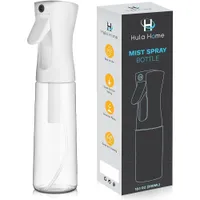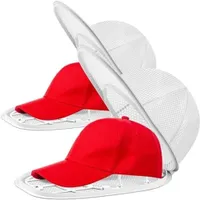How to wash hats without damaging them – 4 methods for different materials and types
These steps ensure you can remove stains, oils, and bacteria from a hat without impacting its appearance or misshaping it


Hats are one of the dirtiest items in our closets, simply because they are rarely cleaned. Most of us don’t think twice when grabbing our favorite hat. But if you stop and ask yourself “When was the last time this hat was cleaned?”, for many, the common answer is, never.
The big reason why so many people don’t wash their hats? They are a lot harder to wash compared to the rest of your wardrobe. Most hats can’t just be tossed into the washing machine without damaging the fabric or warping the shape.
Our step-by-step cleaning tips can ensure your hats retain their shape and integrity. Experts have explained four different cleaning methods depending on the type and sensitivity of the hat – from how to wash hats in a dishwasher to delicate handwashing and spot treatment methods.
How to wash hats without damaging them
A few hot days can quickly turn your hat into a haven for sweat, oil, and hair products. Over time, this mixture can turn your favorite cap into a breeding ground for bacteria, leading to unwanted breakouts and a musty smell. This combined with the fact that bacteria can survive for nearly a month on fabric means your hat could be one of the dirtiest items in your closet if not cared for properly.
Washing hats without causing damage requires a delicate approach and an understanding of the materials involved. Explore our tips for washing hats without damaging them below to keep your hat collection in tip-top condition.
1. Check the tag and material
'Different materials may require different cleaning techniques, so before cleaning, it's important to know the type of hat you are cleaning and what it’s made from. Look at the tag inside your hat. This will tell you what materials it's made from, which is essential for determining the proper care method,' explains the experts from the Kangol hats team. '
'Most hats are not suited for conventional machine washing because the fabric can be damaged or the hat can lose its shape. “Dry Clean Only” means just that! Also, consider the age of your cap.'
Design expertise in your inbox – from inspiring decorating ideas and beautiful celebrity homes to practical gardening advice and shopping round-ups.
'Each hat comes with its unique set of cleaning requirements that largely depend on what it is made with and how it is designed, especially when it comes to the hat's bill,' adds Shaun Veran, microbiologist and COO of OURA. 'The bill or brim of a hat can be made from a variety of materials, from sturdy plastic to delicate cardboard. These materials react differently to water and cleaning solutions; for example, cardboard bills can warp or dissolve if they get too wet.'
Wool hats should be treated more gently than cotton or synthetic ones. For wool hats, hand washing with a gentle detergent designed for delicate fabrics is essential to prevent shrinkage and maintain the hat's form. Baseball caps made from cotton or synthetic blends are hats that can be cleaned in a dishwasher on a gentle cycle using a mild detergent.

Shaun Veran is the COO and Microbiologist of OURA, a pioneering company specializing in antimicrobial, tech-infused home goods and apparel. With a decade of experience in biotechnology and microbial research, Shaun has become a leading expert in microbial growth and innovative strategies to inhibit them.
OURA has harnessed cutting-edge scientific advancements to design products that enhance cleanliness. His extensive knowledge in commercial product development has been instrumental in driving the company’s mission to provide solutions that ensure healthier homes and lives.
2. Test the cleaning solution
The type of cleaning solution you use will depend on the method according to the type of hat you are cleaning and its specific care instructions, but regardless of the product, it's always a good idea to test your detergent on a small, inconspicuous area inside the hat. This will help make sure that it won't cause any damage to the material.
3. Cleaning methods
Depending on the type, material, age, and sensitivity of hat, you can use one of these four methods.
Method 1: Spot cleaning

When you have minor stains or dirt on your hat, spot cleaning is an easy way to address those issues without risking damage to the entire hat.
What you’ll need:
- Fabric cleaner (e.g. OxiClean stain remover, from Amazon)
- A soft cloth
- A toothbrush
Steps:
1. Begin by removing any loose dust and dirt. Gently brush the surface of the hat, especially around any embroidery or embellishments, using a dry, clean toothbrush. Try to dislodge dirt that may be embedded in the stitching.
2. 'Prepare your cleaning solution, either a commercial fabric spray like OxiClean or a homemade spray,' recommends Shaun Veran. 'If you opt to create a homemade solution, mix 1 cup of water with 1 teaspoon of white vinegar and a few drops of dish detergent in a spray bottle.
3. 'Apply the cleaner to the stained area. Use a clean toothbrush or cloth to gently work the cleanser into the fabric, focusing on the stain.
4. 'Blot the stained area with a clean, damp cloth. It’s important to blot rather than rub, as blotting is more effective at lifting the stain without spreading it or damaging the fabric.'
5. Then, rinse off any detergent.
If stubborn stains persist, you may have to hand wash and soak the hat to further break them down.
Hula Home Continuous Spray Bottle | Was $14.99, now $7.99 at Amazon
Method 2: Hand washing

While spot cleaning is suitable for minor stains, a thorough hand wash can provide a deeper clean for hats, especially those that have accumulated a significant amount of grime. While more involved, this method is particularly gentle and suitable for most hats.
What you’ll need:
- A sink or basin
- Warm water
- Mild detergent (e.g. Woolite)
- A toothbrush or soft-bristled brush
- Fabric cleaner (e.g. OxiClean stain remover)
- A sponge or cloth
Steps:
1. Fill your sink or basin with warm water and add a few drops of detergent. Submerge the hat completely in the soapy water, ensuring it is fully saturated. Gently swirl it around.
2. Use a toothbrush or soft-bristled brush to gently clean the exterior of the cap. Focus on any visible dirt or stains to effectively loosen them.
3. 'Using a damp sponge, work the cleanser into the sweatband, focusing on removing oils and dirt,' says Shaun Veran. 'Be careful to avoid getting the brim or fabric panels too wet to prevent damage.'
4. 'If brushing doesn’t completely do the trick, take a clean, dry cloth, gently massage the treated areas to lift away the grime,' recommend the experts at Kangol.
5. 'If there are still remnants of dirt or staining, you can move on to the dry powder option. Be sure to follow the directions on the dry powder cleaner label.'
6. Rinse by dunking the hat into a sink or basin filled with clean water.
7. Use a dry cloth to blot out any moisture from the hat.
You can also pretreat your hat before cleaning it by soaking it for about 15 to 20 minutes up to an hour, depending on the type of material (you won't want to do this with wicker or hats with leather bands.
JSCARLIFE Deep Scrub Cleaning Brush | Was $10.99, now $9.99 at Amazon
USANOOKS Microfiber Cleaning Cloth| Was $15.99, now $9.99 at Amazon
Microfiber cloths are an essential addition to any household cleaning supply list. Perfect for almost any household cleaning task, this pack of 12 is a worthwhile investment.
Method 3: Washing machine

'While washing your hat in the washing machine can be convenient, it is strongly recommended to opt for hand washing instead,' advises Shaun Veran. 'Hand washing is gentler and provides more control over the cleaning process, helping to preserve the hat’s material and appearance for the long term. If you want to use a washing machine, ensure that your hats are made from durable materials (especially the bill).'
What you’ll need:
- A washing machine
- A hat cage
- A mild detergent (e.g. Woolite, from Amazon)
Steps:
1. Place the hat inside a hat mold or cage to protect its shape.
2. Set the washing machine to a gentle cycle using cold water to prevent shrinking and damage.
3. Add a small amount of mild detergent.
4. Start the washing cycle and wait until it is finished. Skip the dryer to prevent shrinking and warping.
5. Carefully remove the hat from the mold or cage and check its shape.
6. Allow the hat to air dry fully inside the hat cage.
Hat Washer Cage | $19.99 from Amazon
'If you absolutely must machine wash your hat, use a hat cage or cap washer to help maintain its shape' advises Hyacinth Tucker, the owner of The Laundry Basket.
These cages are designed to preserve the longevity and shape of hats during washing.
Method 4: Dishwasher

If you want to use the dishwasher method, ensure hats are made from durable materials (especially the bill). The dishwasher is a better option than the washing machine since there is no agitation. However, while washing your hat in the dishwasher can be convenient, it is strongly recommended to opt for hand washing instead to preserve the hat’s material and appearance for the long term.
What you’ll need:
- Dishwasher
- Hat cage
- Mild detergent
Steps:
1. Place the hat securely in a hat cage to maintain its shape and integrity.
2. 'Place the hat on the top rack of the dishwasher to minimize exposure to heat and intense water spray,' advises Shaun Veran.
3. 'Use a small amount of mild, bleach-free detergent to avoid any potential bleaching of the hat's color.
4. 'Select a gentle cycle with cold water. This helps prevent color loss and deformation of the hat. Ensure the heat dry setting is turned off to avoid high temperatures, which could damage the hat.'
5. Once the cycle is complete, carefully remove the hat from the frame and allow it to air dry inside the hat cage.
4. Dry and shape the hat
Pat the hat with a towel to remove excess water. Avoid direct sunlight or high heat, like from a hairdryer because this can cause materials such as wool, cotton, and synthetic fibers to warp or shrink. Hats made with wool, cotton, and synthetic blends used in hats can shrink or become misshapen under high heat.
It’s important to always air-dry hats molded after washing to preserve their original shape. Using a container or form that supports the hat's brim and crown can help maintain its original shape as it dries.
You can place it over a bowl, use a balled-up towel as a makeshift “head” and secure the brim with a loose rubber band to maintain the correct shape during drying. Or, simply place your hat inside the cage and let it air dry naturally.
FAQs
How often should I clean my hat?
'Ideally, hats should be washed after significant use, or at least once a season, to prevent the buildup of sweat and bacteria,' recommends Shaun Veran. 'If you wear hats regularly or in hot climates, you should consider more frequent cleanings. A good rule of thumb – if it looks dirty, clean it.'
What hats can you wash in a dishwasher or washing machine without damaging them?
You can wash cotton or synthetic baseball caps in the dishwasher, and cotton hats in a washing machine. Be sure to use low heat and gentle cycles to avoid damaging them.
Implementing these tips should help maintain the life and appearance of various types of hats, ensuring they can be worn for years without looking worn out or misshapen.
'If you’re a collector, investing in a hat care machine might be good,' suggests Jade Piper, the operations manager for BetterCleans. 'It claims to steam and dry the hat in just 30 minutes!' It can also restore misshapen hats. You can find this Hat Care machine at Amazon.

Lola Houlton is a news writer for Homes & Gardens. She has been writing content for Future PLC for the past six years, in particular Homes & Gardens, Real Homes and GardeningEtc. She writes on a broad range of subjects, including practical household advice, recipe articles, and product reviews, working closely with experts in their fields to cover everything from heating to home organization through to house plants. Lola is a graduate, who completed her degree in Psychology at the University of Sussex. She has also spent some time working at the BBC.



